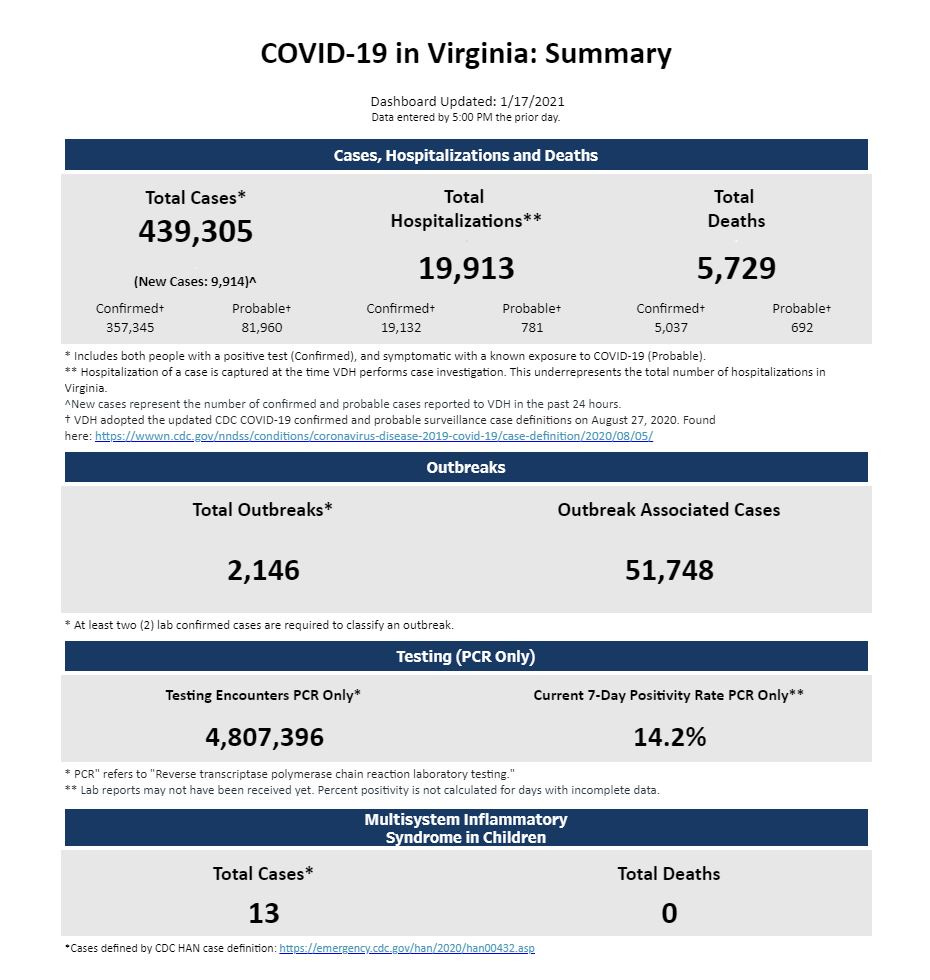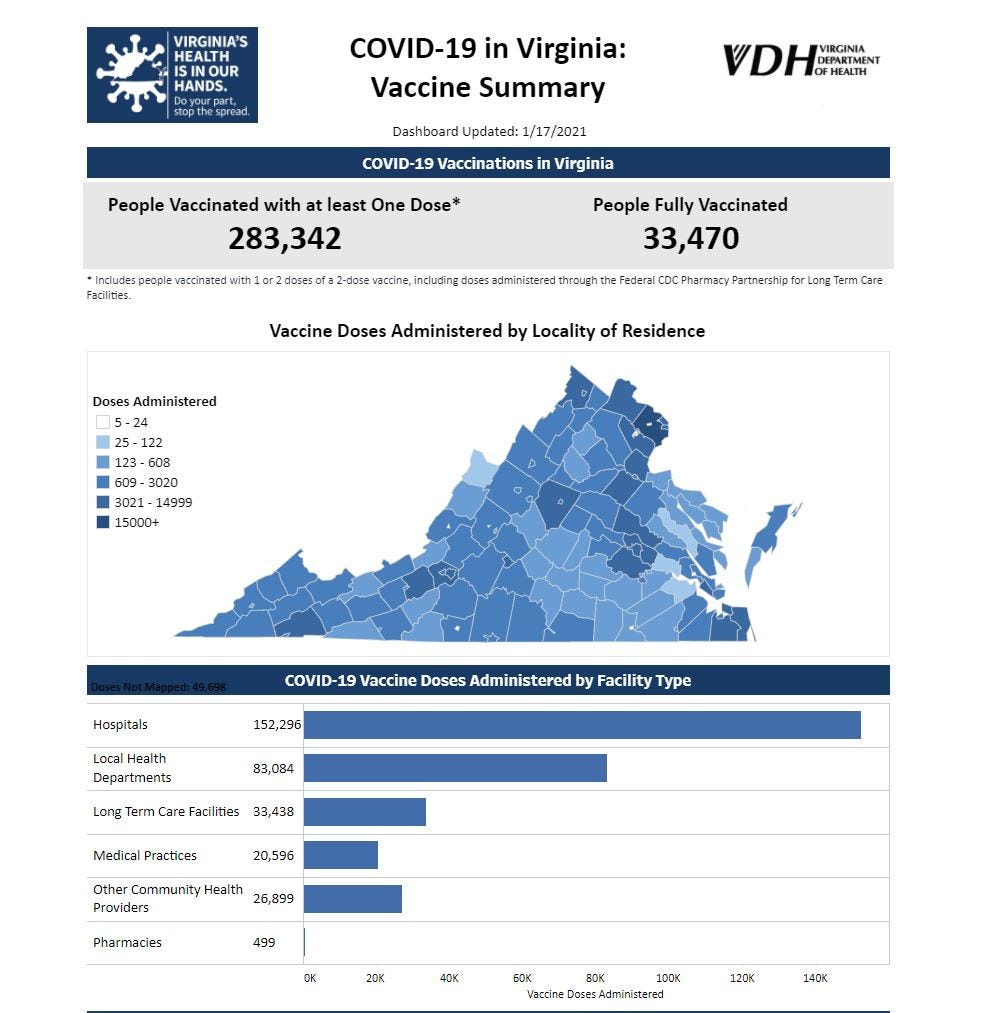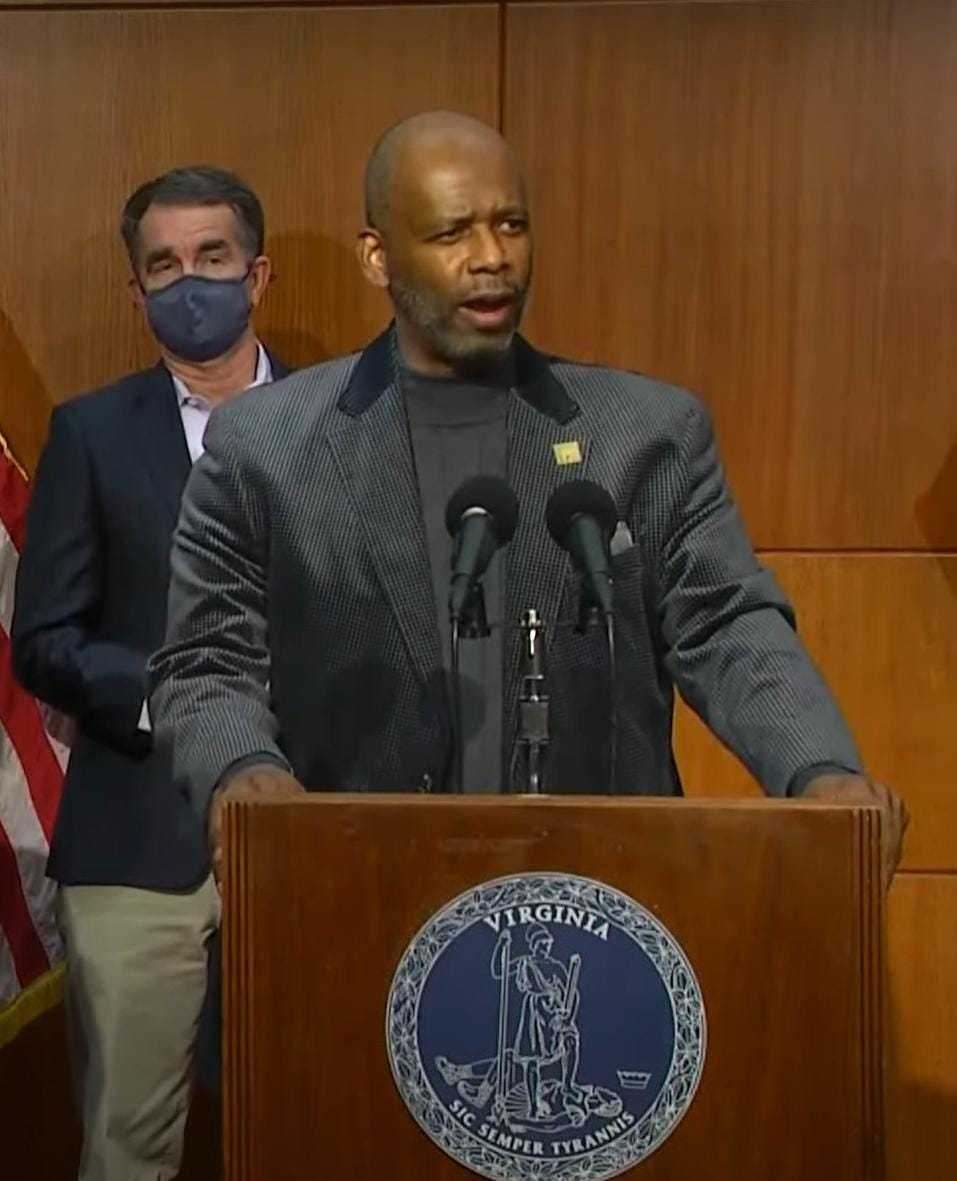The pandemic has been altering our lives for ten months now, and this weekend marks the ten month anniversary of the first episode of what would be the creation of Charlottesville Community Engagement.
As this installment is devoted entirely to the vaccine, it hereby doubles as the 52nd installment of the Charlottesville Quarantine Report.
In today’s show:
On Monday, the University of Virginia Health System will begin helping the Blue Ridge Health District administer vaccines
Virginia’s vaccine coordinator provides update on getting to 50,000 doses a day
D.C. Deputy Mayor Wayne Turnage addresses Black reluctance to vaccinations
Today’s program comes to you with support from Jim Duncan, an associate broker and partner at Nest Realty, who represents buyers and sellers in the Charlottesville area, and writes the long-running realcentralva.com and realcrozetva.com blogs. He’s one of many who wants to support community news.
Let’s start with today’s numbers. Today, Virginia sets another one-day record with 9,914 cases, nearly 3,200 higher than reported the day before.
Over a quarter of Virginia’s total of 439,305 cases have been reported in 2021, an indicator of how much community transmission is happening now, compared to the early days of the pandemic. There is not a corresponding increase yet in the number of deaths, and the total count stands at 5,729 today.
In the Blue Ridge Health District, there has not been January 11, and the death toll stands at 99.
There are another 143 cases reported in the district today. Over a quarter of the 9,558 cases to date have been reported in the past 17 days.
Over 40 percent of Louisa County’s 1,269 cases to date are reported in 2021. In comparison, only 16.2 percent of Charlottesville’s 2,560 cases are from this year. The bottom line is that cases are rising fast, and health officials stress the need to continue to follow safety protocols.

These numbers are going to change fast. Now let’s move now to a different set of metrics. Vaccines.
In the first week of the year, Dr. Danny Avula was appointed by Governor Ralph Northam to coordinate the roll-out of the vaccine by the local, state and federal governments. He briefed the press on Saturday.
“As of today, we have administered a total of 295,202 doses and that is out of a total number of vaccines distributed to Virginia of 943,400,” Avula said.
We’ll hear more from Avula and the state of Virginia later. Let’s first turn to the greater Charlottesville area.
As of Friday morning, nearly 10,000 people associated with the University of Virginia Health System have received their first dose of a COVID-19 vaccine. About a tenth of that number have received a second dose.
Beginning next week, the University of Virginia Health system will send additional resources to the vaccination clinic being run by the Blue Ridge Health District. This is part of the roll-out of Phase1B in the Health District, which is a division of the Virginia Department of Health.
“We will be taking any unused vaccines that we have left over taking care of our own folks and then go over to the K-Mart tent sent up that has been set up by the Health District to help them with vaccinating folks in that group 1b,” said Eric Swensen, a spokesman of the UVA Health System.
Here’s Dr. Costi Sifri, the health system’s director of hospital epidemiology.
“We have doses we think in excess of what we’re going to need to vaccinate our employees,” Dr. Sifri said. “Where that number is i don’t know but it’s probably in the thousands, several thousands.”
But it’s just not doses of vaccine. UVA will begin to supplement personnel required to handle administering the shots in the modular structure.
“I believe on Monday we are sending over vaccinators from UVA Health to support the efforts of the Health District,” said Dr. Costi Sifri, the health system’s director of hospital epidemiology. “We’re going to be sending up to ten. It sounds like initially we’ll be sending four or five as we learn this process but we anticipate within a week we’ll be sending up to ten on a daily basis to help support their efforts.”
Dr. Sifri said UVA Health continues to vaccinate its employees and healthcare workers under Phase1A, and logistics are being planned for Phase1C. That phase may include non-medical faculty, staff and students but the exact determination has not yet been made. That all comes from guidelines provided by the federal Centers for Disease Control, and filtered through the Virginia Disaster Medical Advisory Committee. Dr. Sifri said the various phases may change as more vaccine doses become available.
“We certainly have heard and I think we can all anticipate seeing that there will be more rapid movement to collapsing these tier groups so that we can more rapidly vaccinate everybody within our community and this is true nationwide,” Dr. Sifri said. “I think this will be an evolving plan.”
For the next few weeks, though, Dr. Sifri said initial efforts will focus on those at highest risk in the community. Wendy Horton, CEO of the UVA Health System, said that they will work at the direction of the Health District.
“You know, VDH is really providing the guidance and we are helping with the vaccinations per their guidance,” Horton said. “The bottom line is that next week we anticipate that we will be moving toward community vaccination. We are partnering with VDH and our goal is to really support the vaccination efforts to try to get into the community and try to vaccinate as many people as we can under the guidance of VDH.”
The vaccine roll-out may still take time. Dr. Sifri said people should continue to follow the guidelines that have been in place for ten months now to slow the spread.
“We’re seeing the highest rates that we’ve seen in our community since this has started so it really is incumbent upon us to continue to practice those measures which keep us safe and keep our loved ones safe, and that is to wear masks when you’re not at home, to maintain social distancing, to avoid inside areas that are close with a lot of people, and of course, as always to continue hand-washing,” Dr. Sifri said.
To find out where you are right now in the vaccination schedule, Dr. Sifri recommended signing up with the Virginia Department of Health. (survey)
*
On Thursday, January 14, 2021, Governor Ralph Northam held another press conference where he gave up an update on vaccinations across Virginia. Over the course of the pandemic, Northam has critiqued the federal government for its lack of action. That is changing as the presidential transition approaches. (watch the video)
“In recent days, we’ve seen a new attitude among our federal partners,” Northam said. “We have been able to work much more closely with them.”
On Tuesday, the U.S. Department of Health and Human Services sent out new guidance to states telling them to expand vaccinations to people 65 and over and for those under 64 at risk. Virginia will comply, depending on supplies.
“Communication between the federal, state, and local authorities is key,” Northam said. “This means about half of Virginia is now eligible to receive the vaccine. That’s a major logistical effort and it is not going to happen overnight. Everyone will need to be patient. It’s going to happen as fast as it can be done.”
At the beginning of the year, Northam set a goal of 50,000 vaccinations a day. He appointed the director of the Richmond Health District to coordinate efforts between the multiple layers of government. Here’s Dr. Danny Avula speaking on Thursday.
“What we recognize is that if we’re going to get to 50,000 doses a day, which is what we need to do if we’re going to get herd immunity in the Commonwealth, we really do need to get to an infrastructure that can handle 50,000 doses a day, that we’re going to need to do more,” Dr. Danny Avula said.
The K-Mart site is an example of one of these sites, and the goal is to get them all functioning six to seven days a week across the Commonwealth.
“Our goal is to get this staffed by the National Guard and by contracted vaccinators who will be able to provide this service in large scale,” Dr. Avula said.
Two days later, Dr. Avula gave an update on where things are. The roll-out has been critiqued by several as being too slow. As of this morning, the Virginia Department of Health website reported 316,812 total doses administered, and an average of 15,384 a day. That’s still short of the target.
“We have been steadily increasing the number of doses a day,” Avula said. “If you look on the website, and you look at that seven-day average, it has gone from a few thousand a day to over 14,000 a day.”
Dr. Avula said over 20,000 doses were administered a day from Wednesday to Friday. He said one issue has been that there has been a gap between actual shots in arms and them being entered into reporting systems. Today’s dashboard reports a total of 316,812 doses administered and 943,400 doses distributed.
“So, there’s a gap there and I think that has led a lot of people to ask questions,” Dr. Avula said. “What is going on? Are doses sitting on shelves? How are we not getting doses to the people who need it.”
So far, most of the doses distributed have gone to the people who work for health systems. That will begin to change as more Health Districts move into Phase 1B.
Think back to what Northam said earlier about how the federal Health and Human Services Department authorized people over the age of 65 to be vaccinated? There’s a problem and the federal communications may have been broken down.
“They also intimated that there would be a large release of second dose reserve,” Dr. Avula said. “Remember, this vaccine is a two-dose vaccine and the way the federal government had been allocating that is that they’d been sending out first doses and holding back second doses and then delivering those second doses as they came ready to deliver those second doses. And so we were hearing consistent messaging from the federal government that all of those doses were going to be released. As a Commonwealth we decided to follow the federal government’s lead to add those 65 and up and those with underlying conditions to our Phase 1b. Over the last couple days we have heard very different messaging and we’re not exactly sure what to do with that but the sense is that may not actually be the case and our allocations may not actually be increasing is what we’re hearing and is certainly is disconcerting and disheartening given that we made the first step to expand our 1B under the assumption we’d be receiving more vaccine.”
Nonetheless, Dr. Avula said Virginia continues to receive 100,000 doses or so each week.
“The state is not holding back any of the that vaccine,” Avula said. “It is all being sent out to providers.”
Dr. Avula said it will take time to get through all Virginia residents, and to ramp up to the target of 50,000 doses a day.

*
One of the identified issues with getting the vaccine distributed widely is hesitance in the Black community. Wayne Turnage served as chief of staff for former Governor Tim Kaine and is now Deputy Mayor for the D.C. Health and Human Services agency. He said we’re in serious times.
“Two hundred and thirty thousand new infections per day, more than 4,400 deaths per day, [a number] growing by nearly fifty percent every two weeks,” Turnage said. “All offer further indication that we are in the worst pandemic in more than a hundred years.”
Turnage said mass vaccinations are the best way to get back to something close to normal life. He volunteered in one of the vaccine trials, but learned afterward his experimental dosage was a placebo. Turnage has since received his first actual shot.
“Epidemiologists explain that this virus will continue to propagate until it can no longer find fuel among the population,” Turnage said. “We further understand that to build a fortress to prevent this continuing spread, roughly 60 to 70 percent of the 330 million people in this country must be vaccinated, effectively creating through mass inoculation the much discussed herd immunity. Yet in jurisdictions all over the country, large numbers of African-Americans have expressed a stubborn resistance to the government’s expectations that U.S. citizens agree to be vaccinated in hopes of controlling this devastating spread of COVID-19. Our reluctance is understandable for it is borne of a justifiable mistrust of medical experiments that were once implemented in the Black community using methods that violated the most basic research ethics for conducting experimental trials.”
Turnage pointed to his experience going through the vaccine trials as an example of his personal confidence in the process. He said the safety records during the vaccine creation process is safe and that the two brands authorized have been proven to be effective. Turnage made several points, and the first was about the design of the vaccine.
“One of the routinely expressed fears of the Black community is that the vaccine will actually expose them to the virus and make them sick,” Turnage said. “However, these vaccines are not similar to the most traditional viruses and vaccines, which often consisted of the actual virus itself. For example, the polio virus was made of the live virus prior to 2000, and since then it has been made from a deadened or attenuated form of the live virus. Likewise, vaccines for measles, the flu, rubella and the chicken pox, are made from a live, or weakened virus. Though extremely rare, in such cases there is always the possibility that an attenuated virus can turn pathogenic and cause the disease both in the person who was vaccinated and their close contacts. But the current vaccines to fight COVID in this country are built from a new and smartly innovative technology based on a single molecule that has the ability to communicate with your body’s protein-making machinery. Making protein is a normal biological function of your body. Based on the instructions that your body receives from this single molecule, your body is forced to make spike proteins that have the exact appearance of the virus and thus your immune system is tricked into developing antibodies to fight COVID should you ever be exposed.”
Turnage said that means there is no chance of contracting COVID from the shot.
“The takeaway is that once you get vaccinated, you have less than a five percent chance of contracting COVID,” Turnage said. “And if you get infected despite having the vaccine, there appears to be next to a zero chance that you will become deathly ill.”
What’s next in the pandemic? Make sure you are signed up for the Charlottesville Community Engagement newsletter to make sure you’re up to date. It’s not just about the pandemic, but about the greater Charlottesville community as we work through the challenges that we face. Thank you for reading and listening, and please send on to a friend.
















Share this post